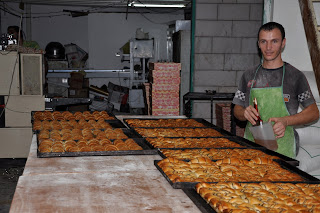 |
| Yousef & Khitam |
"The staff" of this remarkable little organization is Houda, a young Palestinian woman, and Yousef. Houda porbably gets paid but not much; Yousef no. Sound familiar, like too many non-profits doing good work? Houda was wearing a full length robe over her clothes and her hair was covered. She was quiet and I initially assumed she spoke only Arabic; however, I later discovered that she spoke very good English. When I left I noticed she was reading THE COUNT OF MONTE CRISTO, in English, no small undertaking for a native speaker! When in other lands, we monolingual Americans are often reminded how limited we are by our failure to take language and culture seriously, but that is a topic for another conversation.
Yousef's Center has brought many volunteers from Europe, England and the States to Jenin to work with young people in the Center, which has limited space, and in schools and outside in the summer. An Italian theater company produced a play with them that traveled to Italy for several performances. A Irish artist did art projects with the kids; an American musician played for them and did workshops; a Dutch musician did music workshops with teachers and students, showing them ways to make music without instruments, which reminded me of some of the work Jim Hall does with our Spindleworks ensemble at The Theater Project. A lot of remarkable projects and this on a shoe string budget. Yousef is finding out that his primary task is raising money for the Center's work.
I asked him what his dream is. "To be on the map," he said, meaning for Palestine to receive recognition as a country and no longer be occupied. "And after that?" I asked. "To get my Ph.D." He has a masters from Sweden in public policy and peace works. He is a smart and committed man. Since the wall went up, his family has been challenged by the fact that his wife, an Israeli Palestinian - yes, there are Palestinians in Israel, about a million of them, 20% of the population, I think - was from a village on the western or Israeli side of the wall and they lived - and live - on the eastern or Palestinian side of the wall. For her to "establish residence" in their village on the Palestinian side of the wall probably means she loses her Israeli passport, which results in numerous limitations with the occupation. After waiting to figure out a solution, they have finally decided that she will officially live on the Palestinian side of the wall and then deal with the consequences.
"Consequences." Here's an example of the difficulties brought about by the wall: one of their three children broke his - or her - leg at age four. By the time they got to the check point, it was a little after 5:00, and the check point closed at 5:00, and probably still does. The hospital was on the other side, so they had to wait until the next morning to cross through the check point and get their child with the broken leg to the hospital.
 |
| A village on the way to Jenin |
 |
| Yousef's family's bakery - YUM! |
 |
| The horse sculpture |
The stop was in Nablus for Palestine's most famous knafe bil jibneh. I mentioned it in an earlier blog: Ahmad and I had knafe in old Jerusalem, "the best knafe in the old city," he said. "I once had knafe in Nablus," I said, "which my friends told me -" "Oh, Nablus!" he interrupted. "That's the best in Palestine." Nablus was crowded - Thursday night is like Friday night in the States, Friday here being the equivalent of our Sunday. Khitam found a place she could squeeze her Korean car into and after asking several people for "abu Falha kanafe," because if it is "abu Falha," it is true Nablus kanafe. We found the place, which was very busy on a Thursday night and got our kanafe, which was pretty much the dish of the evening. After we'd each had a piece, Khitam looked at me, hesitated, and then said: "Wanna share one more piece?" I started to say no, but hesitated, then said, "Sure, I'll have a little." We shared another piece, I ate half, not "a little," and we hurried out after paying before we were tempted to eat more. Another hour and we were home.
On the drive home, we talked more about Palestine and Israel. About Israeli Jews, Khitam said: "Those born here after 1948, no one's gonna push them out. It's stupid to even mention it. And, they are most welcome if I am. That means the same rights for everyone." Sounds a little like everyone's being entitled to "life, liberty and the pursuit of happiness." Of course in those days, our forefathers were not really considering slaves and Native Americans as "everyone," were they.
More tomorrow.
Al, maddening and heart wrenching but also inspiring to hear about Yousef and his work. Fantastic pictures. I look forward to more!
ReplyDeleteSeems fitting to be opening The Crucible tonight after this post, huh?!
ReplyDeletemiss you! love to Khitam. Love,
Wendy
So wonderful sharing your visit and thoughts, and to see and hear about pockets of goodness in a confused world.
ReplyDelete